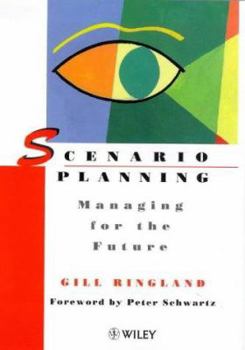Scenario Planning
Select Format
Select Condition 
Book Overview
Scenario Planning Managing for the Future Gill Ringland "Nobody can ignore the future. This book is a must-read for any manager aspiring to put scenarios into practice." Arie De Geus, Former Director of Shell International Petroleum and author of The Living Company "Never since the great geographical expansions of the eighteenth century has so much latent potential been met with tools so ill-fitted to harness it. Information technology will change...
Format:Hardcover
Language:English
ISBN:047197790X
ISBN13:9780471977902
Release Date:January 1998
Publisher:John Wiley & Sons
Length:407 Pages
Weight:1.70 lbs.
Dimensions:1.1" x 6.2" x 9.3"
Customer Reviews
3 ratings
Insightful!
Published by Thriftbooks.com User , 20 years ago
Sure, you worry about what changes the future will bring for your business. But do you have a sensible and logical way to respond to the uncertainties that keep you up at night? If not, this intriguing book will set you on the right path. British corporate strategist Gill Ringland offers persuasive evidence that scenario planning is a worthwhile pursuit, and she recounts in useful detail her own experiences and those of large corporations looking for an edge up on the future. The book is organized in four sections: the links between scenarios and strategic planning, a rundown on different theoretical approaches (French School, Futures Group, CSM, Copenhagen Institute, and more), a set of eight case histories and several examples of actual, step-by-step scenarios. While Ringland's writing is inconsistent and can be dense and jargony, she nevertheless offers plenty of useful information that serves as a path for anyone embarking on scenario planning. We suggest this book to managers and corporate strategists seeking ways to deal with the uncertain future.
Almost everything you need to know about scenario planning
Published by Thriftbooks.com User , 24 years ago
Most books on scenario planning either entertain us with their stories of possible futures or delve into intensely dull details of scenario construction. Ringland's book has the virtue of avoiding these two extremes. This wide-ranging book will suit both newcomers and veterans of scenario planning. Each kind of reader can pick out what they need from the four sections. Part I introduces scenario planning from the point of view of strategic planning at ICL in the UK. Ringland shows how scenarios can be linked to strategic planning and how they can be used for learning or to influence public opinion. Part II take a more theoretical approach, outlining eleven different methods, including those used by the European Commission, Global Business Network, and SRI, as well as computer-driven simulations. Part III presents eight case studies, allowing the reader to see the process as it was applied to British Airways, Cable and Wireless, the UK's National Health Service, and Shell. Finally, Part IV shows examples of scenarios including those developed by the author's company ICL, and MIT's scenarios for 21st Century organizations.Hardly anyone these days has the time to read a 400-page book. Fortunately, Ringland has structured Scenario Planning to make it easy to pick out just what the reader needs. The variety of approaches explained and the range of case studies and examples is like a large menu from which the reader can choose just the tidbits desired. A well-balanced reading of selected chapters will provide all the essential elements needed to understand scenario planning. On the other hand, the book's main shortcoming arises from its breadth. No one approach is explained in sufficient detail to create a systematic and thorough understanding of any particular method. Such detail can make for tedious reading and may be unnecessary. But if you want to drill down to minute details, skimming Ringland's book will be a great warm-up before tackling Van der Heijen's book.
Great Scenario Working Book
Published by Thriftbooks.com User , 24 years ago
Aimed at business strategists or consultants, this book provides many deep, usable tools, examples, and approaches assisting the development of more robust projects and organizations across a range of futures.The attractively illustrated, deep resources span:++ Part 1 (a standalone "book")- history and background of scenario planning (SP); current state of the art; ICL use of SP in projects; examples of SP (including 2 day workshop at world-class Manufacturing Systems Integration Research Institute at Loughborough University, UK); and learning.++ Part 2- describes various approaches - BASICS, CSM, STRAT*X, Copenhagen Institute, EC,, French School, Futures Group, Global Business Network, NCI, and SRI.++Part 3- case studies for range of approaches used across sectors- British Airways, Cable & Wireless, ECRC, Electrolux, UK National Health Service, KNRONE, Shell and United Distillers.++ Part 4- scenarios- ICL, the Internet, Telecoms industry, Shell, Hemingford, and 21st Century Organizations.Despite covering a very broad and deep content, the structure, style, and excellent use of sidebars/charts/lists/ and "glue" (or linking text) make this a very approachable working book & reference source for the scenario planning. The emphasis is on practicality, rather than theory, as befitting an author with significant practical experience. The only complaint, is that sometimes too much detail is given (reading a bit like a lab-report- the author's a physicist, after all!).Overall, a great practical text which goes very well with the high quality and more abstract view (less case studies, more emphasis on process) in Kee Van Der Heijden's "Scenario's- The Art of Strategic Conversation" (Wiley, 1997, ISBN 0471966398).






